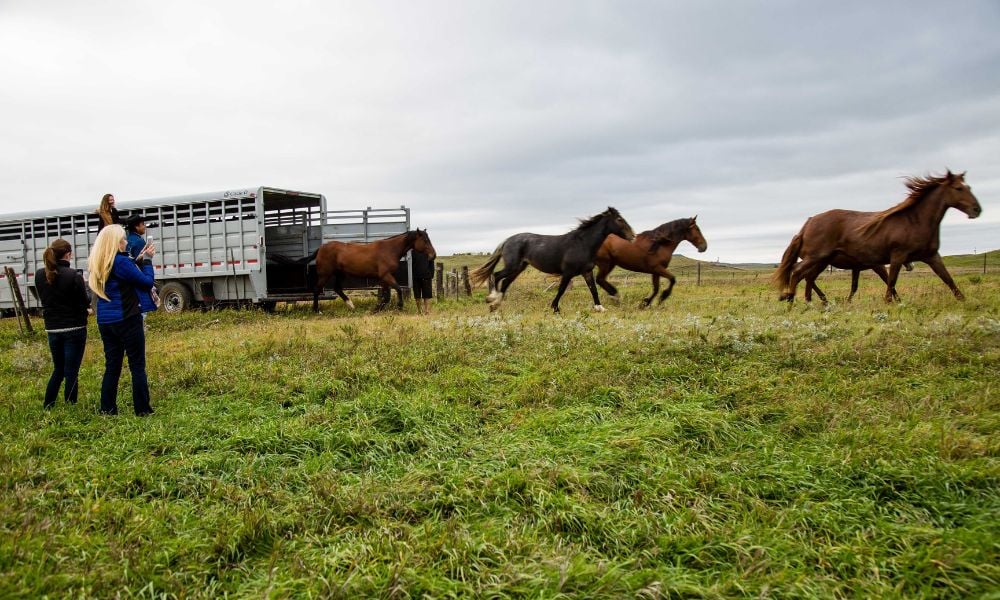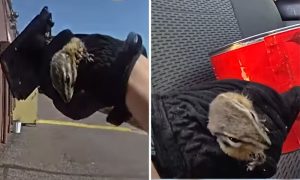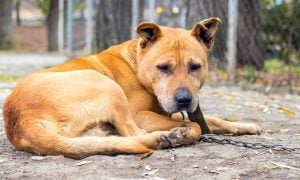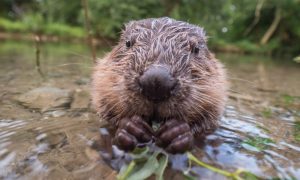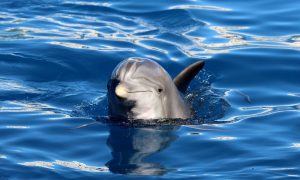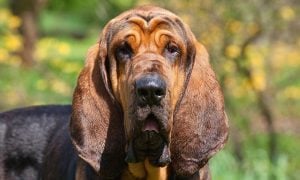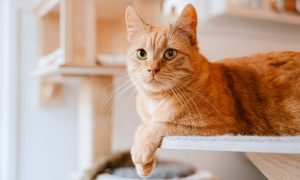What started as a child’s love of horses has grown into a critical and life-saving movement to save wild horses and rewild habitats by a powerhouse protector.
Manda Kalimian, the founder of Long Island-based nonprofit CANA Foundation, has been on a mission for more than a decade to educate people — and the U.S. government — about the important ecological role that wild horses have on grasslands and climate change.
Using science-backed research and innovative DNA testing, the CANA Foundation has helped establish that wild horses, as we know them today, have been in the United States for thousands of years longer than anyone had formerly anticipated.
Further studies also have shown that while horses’ roles in humans’ lives may have shifted since ancient times, they remain a keystone species that helps nature operate in balance, Kalimian added.
Congress passed the Wild Free Roaming Horses and Burros Act in 1971 to protect wild horses, recognized by many as iconic symbols of the United States and acknowledged by the government to be “an integral component of the natural system.” But rather than be recognized as the sacred and fascinating animals they are, America’s wild horses are increasingly being rounded up in brutal ways and shipped to government holding facilities or slaughter.
The federal Bureau of Land Management frequently defends the wild horse roundups — despite the federally protected animals dying in droves from snapped necks, broken bones, and other injuries — by claiming the removals are needed due to restricted foraging, reported habitat damage, and mandates to maintain a “thriving ecological balance.”
Kalimian told Lady Freethinker that narrative is only one part of the story.
“The herd management areas for wild horses are now only half of what was given in 1971,” she said. “When you zero out these areas, not allowing any wild horses within them, then you are pushing both cattle and horses into these same areas that are becoming destroyed. The truth is that 90 percent of the time, the damage is not coming from the horses.”
Rounding up wild horses is not only brutal; it’s also a “solution” that costs American taxpayers, on average, a whopping $100 million-plus each year.
“Taxpayers are paying for wild horse roundup, transport, and slaughter under the erroneous belief that horses are ‘invasive’ and provide little value to the land,” Kalimian said. “But horses have been our companions and compatriots from the beginning. There is history and culture connected to these horses, and our government is literally destroying our history.”
Kalimian and CANA Foundation are pushing for rewilding — a more compassionate approach that will contribute to human happiness, species biodiversity, and the life that wild horses deserve.
“Rewilding is basically allowing nature to rebuild itself in the way nature knows how,” Kalimian said. “The world must rewild on a massive scale to heal nature and climate.”
Kalimian spoke with Lady Freethinker about the importance of wild horses, how they contribute to a true thriving natural balance, and actions that people can start taking to combat climate change and speak up for horses.
The following Q&A combines an interview and information from the CANA Foundation and has been edited for length.
To learn more about the CANA Foundation, visit their website here or pick up a copy of Kalimian’s book Born to Rewild: Triumphs of a Now Fearless Woman. You can also check out the CANA Foundation’s tips for getting involved and taking meaningful actions for wild horses here.
A Q&A with Manda Kalimian, Founder of the CANA Foundation
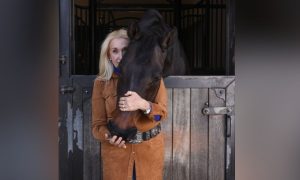
(Courtesy of CANA Foundation)
Tell us more about your journey into becoming a horse rescuer and wild horse advocate.
My parents put me on a pony when I was 3 years old, and then told me if I got good grades I could get a horse when I was 13 — and that was it. But then I had to go to college, and my parents said it was time to “grow up.” My horse was sold. I went into sales and marketing, got married (my engagement present was a horse!) and had two kids.
Then I saw an email from a rescue on the east coast that was trying to raise funds to stop horses from going to slaughter. That email blew me away and mortified me.
I’ve never been the kind of person who does nothing. I caught up with the woman and learned about horses being transported overseas for slaughter in Mexico and Canada and asked what I could do. I ended up buying four horses — a mare, a stallion, and two geldings — so they would not go to a kill buyer. I kept the mare, and my friend Lucy helped find homes for the other three.
I can’t believe how many things unfolded once I started my journey. Through advocating for the wild horses, I realized the bigger piece — that horses have played such a pivotal role in our history. Some people think their value has now diminished because we have planes and cars, but that’s not true. They are more important now than ever.
New CANA-supported research, published in Science, notes that horses in North America were found integrated into indigenous communities in the western U.S. long before European colonizers arrived to that region. Why is this important?
I’ve always believed that the horse was here in some capacity — that the horse that went over the Bering Land Bridge and came back over here in ships is the same one that was here. (Editorial Note: Read more about the history of horses here.) CANA supported research with DNA evidence that shows horses were here 6,000 years earlier than former researchers thought. Given those two points, when we talk about horses, we say that they are “native.”
Can you tell us more about horses as a “keystone species”?
A keystone species is one with a disproportionately important role in the natural environment, relevant to its abundance. Wild horses help open up landscapes; they graze in a way that helps create space for other animals and plants. They keep brush under control, which can help prevent wildfires. Their manure disperses undigested seeds, which can increase biodiversity and also helps with carbon sequestration. They also help other animals survive droughts through their unique ability as dowsers to smell underground water near the surface.
CANA Foundation works closely with tribal people to protect horses. Can you tell us more about what you call “Traditional Ecological Knowledge”?
Traditional Ecological Knowledge (TEK) is the ongoing accumulation of knowledge, practice, and belief about relationships between living beings in a specific ecosystem that is acquired by indigenous people over hundreds or thousands of years through direct contact with the environment, handed down through generations, and used for life-sustaining ways.
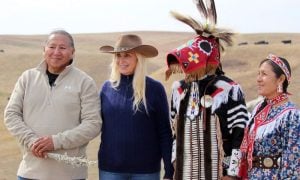
(Courtesy of CANA Foundation)
It seems like wild horses are getting pinned with the blame for habitat “degradation” — what other factors are at play here?
Overgrazing, intensive agriculture, prevention of naturally-occurring fires, and contamination are key factors in erosion and biodiversity breakdown. Methane emissions from agricultural farming, oil, and fracking contribute to desertification and the ‘megadrought’ in the Great Basin states.
The thing we need to remember is that this country, today, is based on a “cowboy culture” – what the American West was, the concepts of manifest destiny, and the conquest of all things. A ranching culture developed; and in that context, the government doesn’t want to value these horses.
“Managing horses” isn’t about “managing resources”; it’s become political with people wanting the grass and water for their privately-owned cattle.
In herd management areas, wild horses are being removed while the government continues to lease the land to private ranchers. What would you like to say about that?
Horses graze; cattle graze. But there’s a difference. Ruminants (including privately-owned cattle) tend to move in a block and in a way that’s more impactful on the land. Raising cattle also is well known for creating high levels of methane emissions.
Wild horses (non-ruminants) have much less of an impact because their bands are smaller and they move at greater speeds across the land. Their manure is nutrient rich from the plants they eat, and they are passing out intact seeds along the way, which helps grasslands.
Why should EVERYONE care about the plight of wild horses — not just horse lovers or people concerned about climate change?
I can give you a whole menu of reasons! But if you don’t care about horses, if you don’t care about climate, I have a question for you: Is rounding up and holding wild horses how you want the government to spend $120 million of your taxpayer dollars? Do you want to pay for 60,000 to 70,000 wild horses to sit in government facilities — is that how you want to see your money spent? Wouldn’t you rather the government spend that money on you? Because if these horses are managed properly — if they are allowed to do what they do — then we can have them help us and all the other species, all while living in a healthy way themselves.
What can people do to help wild horses and the planet?
We tell people to contact their Congress members, but it’s also important that you vote. Vote for decision makers who will protect wild horses, and insist on environmental rewilding initiatives with wild horses on public lands.
What else would you like our readers to know?
I chose to make this my battle, but we all have the capacity to do something. Pick something. Rewild your backyard. Plant some native species. Feed your birds. Be mindful about what you buy. Use natural products that don’t harm you or the planet. Support companies that genuinely make a difference. Educate the community about being nature considerate. Care.
Being with nature grounds you and reminds you who you are. After you create your own rewilded space, spend time in that space with loved ones. It will give you life as you have given it.
People think that their participation doesn’t matter, but that’s not true. Everything matters. The success of our planet means we will thrive as inhabitants. The failure and demise of our planet will trickle down to us as a people, emotionally and physically.

